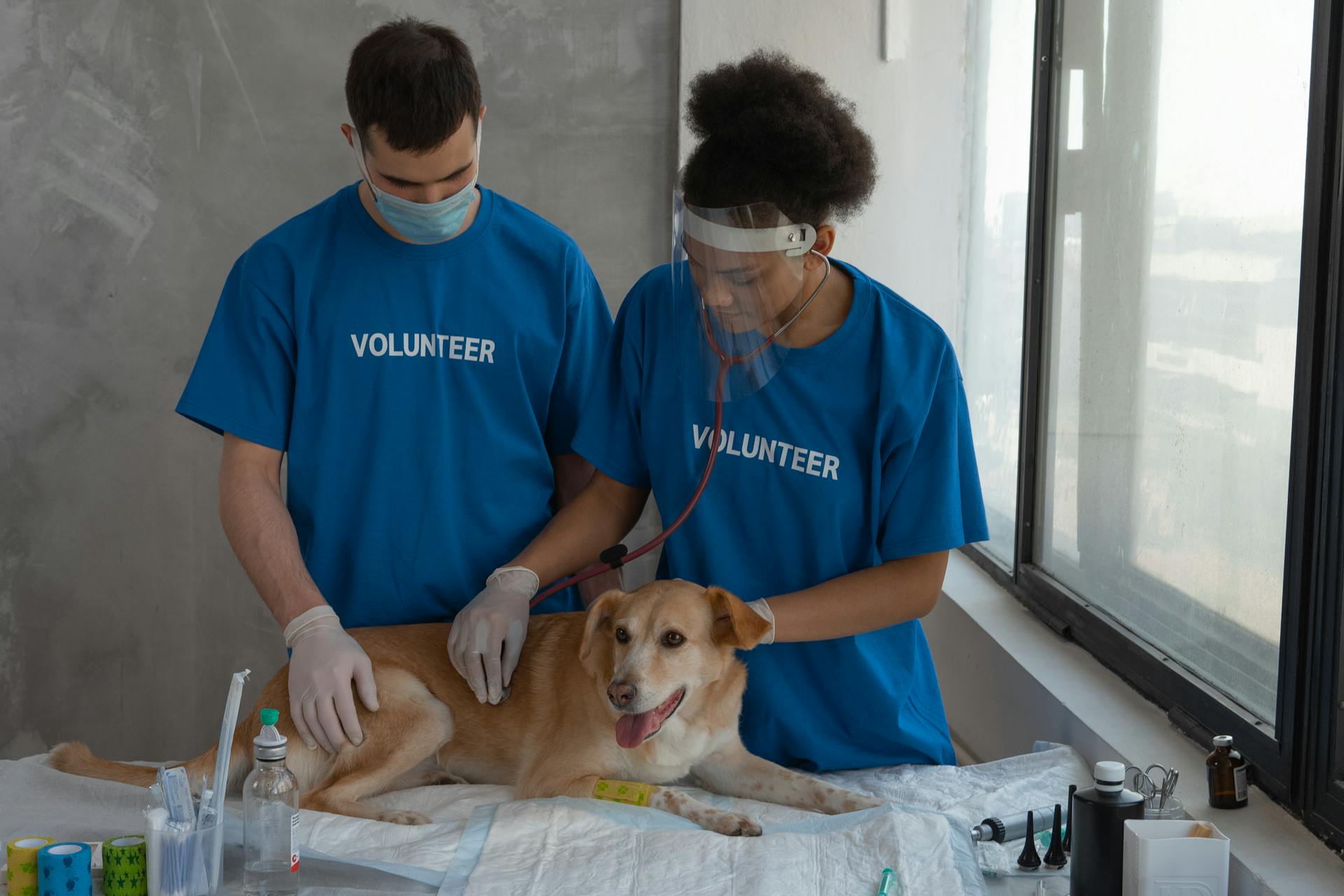
If your dog is vomiting undigested food, it's natural to feel concerned and wonder what's going on.
This behavior can be a sign of gastrointestinal issues, such as food allergies, sensitivities, or gastrointestinal foreign bodies.
Some common causes of vomiting undigested food in dogs include eating spoiled or contaminated food, eating too quickly, or having a food allergy.
Dogs may also vomit undigested food if they have a gastrointestinal foreign body, such as a swallowed object or a blockage in the digestive tract.
In some cases, vomiting undigested food can be a symptom of a more serious underlying condition, such as pancreatitis or gastrointestinal cancer.
If your dog is vomiting undigested food, it's essential to consult with a veterinarian to determine the underlying cause and develop a treatment plan.
Explore further: Shih Tzu Throwing up Undigested Food
Causes of Vomiting
Dogs vomit for a variety of reasons, and it's essential to get to the bottom of the cause to provide the best possible care for your furry friend. Acute vomiting, which can be defined as sudden or severe bouts of vomiting, is a serious symptom of many diseases, disorders, and complications, including ingestion of irritating substances, toxins, pancreatitis, kidney failure, and more.
Intriguing read: Dog Vomiting Yellow Bile
Some common causes of vomiting in dogs include diet change, intestinal parasites, viral infection, medication reaction, bloat, and bacterial infection. If your dog vomits after being outside in the hot sun, heatstroke is a prime suspect. If your trash can displays evidence of canine exploration, then garbage, toxins, or a foreign body are more likely.
Vomiting can also be caused by primary gastrointestinal disorders or systemic disorders. If your dog is vomiting with diarrhea or vomiting with a poor appetite, call your veterinarian immediately. Persistent vomiting, which can be a sign of a more serious health problem, may be a sudden, repeated retching and vomiting of frothy and clear fluid.
In some cases, vomiting can be caused by a foreign body, which is the general term for something a dog swallows that can't pass through the digestive system. If your dog is vomiting on an empty stomach, it could be due to empty tummy syndrome or irritation from stomach acid that collects when the stomach is empty for too long.
Here are some potential causes of vomiting in dogs:
- Ingestion of irritating substances (e.g. garbage or chocolate)
- Toxins or poisons
- Pancreatitis
- Kidney failure
- Liver failure
- Diet change
- Intestinal parasites
- Viral infection
- Medication reaction
- Bloat
- Bacterial infection
- Heatstroke
- Foreign body
- Empty tummy syndrome
Diagnosis and Treatment
Diagnosis and treatment of vomiting in dogs can be a complex process, but it's essential to determine the underlying cause of the vomiting to provide effective treatment. Your vet will likely recommend a combination of diagnostic tests and treatments based on the severity of the vomiting and your dog's overall health.
If your dog is vomiting undigested food, your vet may recommend withholding food for a short period (12-24 hours) and then reintroducing a bland diet fed in small regular meals. This can help to settle the stomach and reduce vomiting. Water should not be withheld from vomiting dogs, but should be offered in small regular amounts.
Your vet may also recommend further investigations, such as blood tests, a diet trial, radiographs (X-rays), ultrasound, endoscopy, biopsies, fecal samples, or urine samples, to determine the underlying cause of the vomiting. These tests can help to identify systemic disease, food allergies, obstructions, or other conditions that may be contributing to the vomiting.
For another approach, see: Raw Food Diet for Dogs
Here are some common diagnostic tests and treatments used to diagnose and treat vomiting in dogs:
- Blood tests: to investigate for systemic disease, food allergies, or digestive function.
- Diet trial: to eliminate a food source and diagnose food allergies.
- Radiographs (X-rays): to identify masses or obstructions in the digestive tract.
- Ultrasound: to identify masses, obstructions, or inflammatory bowel disease.
- Endoscopy: to visualize the oesophagus and stomach, and remove foreign material.
- Biopsies: to take tissue samples from the digestive tract and diagnose disease processes.
- Faecal and urine samples: to identify infectious causes of vomiting or kidney disease.
Symptomatic treatment may also involve fluid therapy, medications, or surgery to address underlying conditions and prevent dehydration, electrolyte imbalances, and acid-based disorders.
Diagnosing
Diagnosing the cause of your dog's vomiting is a crucial step in determining the best course of treatment. Your veterinarian will ask you questions about your dog's access to garbage, poisons, and toxins, as well as any recent dietary changes. They'll also want to know if your dog is exhibiting any other symptoms.
To narrow down the cause, it's essential to provide your veterinarian with as much information as possible. If your dog has been vomiting after being outside in the hot sun, heatstroke is a prime suspect. If you've noticed your trash can has been explored, garbage, toxins, or a foreign body are more likely.
Your veterinarian will perform a physical examination and may recommend additional tests, such as blood work, ultrasounds, X-rays, endoscopic evaluations, biopsies, and urine tests. Blood tests can help investigate systemic diseases like kidney or liver disease, while a diet trial can be used to diagnose food allergies.
Here are some common diagnostic tests used to determine the cause of vomiting:
- Blood tests: to investigate for systemic disease, check the pancreas and digestive function, or diagnose food allergies
- Diet trial: to eliminate a food source and diagnose food allergies
- Radiographs (X-rays): to identify masses or obstructions in the digestive tract
- Ultrasound: to identify masses and obstructions in the digestive tract, and check the thickness of the gut lining
- Endoscopy: to visualize the oesophagus and stomach, remove foreign material, and take biopsies
- Biopsies: to take tissue samples from the digestive tract and determine the type of disease process
- Faecal sample: to identify infectious causes of vomiting
- Urine sample: to identify kidney disease, infection, and diabetes
Your veterinarian will examine your dog and, depending on the information you provide and the findings of the clinical exam, may recommend treating your dog symptomatically or further investigations.
Treatment
When your dog's vomiting persists, it's essential to consider fluid therapy if they're unable to keep food or water down. This is because dehydration is a significant risk, and fluid therapy in hospital may be necessary.
Symptomatic treatment can be started initially, which involves withholding food for 12-24 hours and then reintroducing a bland diet in small regular meals. Water should not be withheld, but offered in small regular amounts.
Changing the diet to a bland, highly digestible food can help settle the stomach. Royal canine gastrointestinal or sensitivity control foods are suitable options, but home-cooked diets of plain boiled chicken or white fish can also be helpful for a short time.
If vomiting continues or recurs when food is reintroduced, your pet should be seen by the vet again. This is crucial for identifying the underlying cause and preventing further complications.
Other treatment options include medications, such as anti-emetics and antacids, which can be prescribed by your vet based on the cause and your dog's condition. In some cases, surgery may be necessary to remove obstructions, such as ingested toys or masses.
Here are some general guidelines to follow:
If your dog's vomiting persists, or you have any concerns, it's always best to consult with your vet for personalized guidance and treatment.
Symptoms and Signs
If your dog is about to vomit, you might notice them feeling anxious and restless, or coming to you for attention and comfort. Some dogs will even drool and swallow repeatedly just before vomiting.
Dogs often exhibit specific behaviors when they're about to throw up, such as drooling, licking their lips, swallowing excessively, and standing head down looking worried. These signs can be a signal to move your pet to a better location to prevent damage.
Here are some common signs of a dog about to vomit:
- Drooling
- Licking their lips
- Swallowing excessively
- Standing head down looking worried
Signs of Impending Vomiting
If your dog is about to vomit, you might notice they're feeling anxious and restless. This can be a sign that something is off, so keep an eye out for it.
Dogs often look for comfort and attention from their owners when they're not feeling well, so if your dog is coming to you for attention, it could be a sign they're about to vomit.

Drooling and swallowing repeatedly just before vomiting is another common sign. If you notice your dog doing this, it's a good idea to get them to a safe location quickly.
Dogs may also drool, lick their lips, swallow excessively, and stand head down looking worried when they're about to throw up. These signs can give you a heads up, allowing you to move your pet to a better location.
Vomiting on an Empty Stomach
Vomiting on an empty stomach is a common issue in dogs, and it's essential to understand the potential causes. Some dogs vomit when their stomachs are empty for too long, which can be due to irritation from stomach acid.
This condition is commonly called empty tummy syndrome or bilious vomiting syndrome. It's often characterized by vomiting bile and foam in the early morning hours. In some cases, offering a small meal before bedtime can solve the problem.
Worth a look: Why Is My Dogs Stomach Making Noises and Not Eating

If feeding more frequent meals doesn't help, the cause could be a foreign body, which is an object a dog swallows that can't pass through the digestive system. This can lead to vomiting, especially when the stomach is empty.
Here are some common signs that your dog may be vomiting due to a foreign body:
- Throwing up bile and foam in the early morning hours
- Having a good appetite but vomiting after eating
- Having a dull and dry coat
In some cases, the foreign body may be visible in the vomit, which can be a relief for both you and your dog. However, in other cases, it may be a mystery, and further testing such as an endoscopy may be necessary to diagnose the issue.
Frequently Asked Questions
Why is my dog not fully digesting food?
Your dog may not be fully digesting food due to a lack of digestive enzymes from the pancreas or small intestinal disease. Learn more about the possible causes and how to address them to ensure your dog's optimal nutrition
Sources
- https://www.mavenvets.co.uk/pet-help-advice/dogs/99-vomiting-in-dogs
- https://franktownanimalclinic.com/what-to-do-when-your-dog-is-vomiting/
- https://www.akc.org/expert-advice/health/dog-vomiting-causes-diagnosis-and-treatment/
- https://www.vetwest.com.au/pet-library/vomiting-dog/
- https://www.whole-dog-journal.com/health/digestion/dog-vomiting-the-complete-guide/
Featured Images: pexels.com


